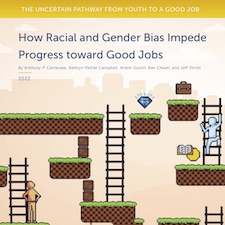Young Women Are Better Educated But Are Still Less Likely to Have Good Jobs
Posted on May 25, 2022 | Comments 0
 A new report from the Georgetown University Center on Education and the Workforce, funded by a grant from JP Morgan Chase, finds that over the past several decades, the pathway to a good job has become longer and more challenging for young adults to navigate. Today, most young workers do not attain a good job until their early 30s, and only young workers with a bachelor’s degree or higher are consistently more likely than those in the previous generation to have a good job before age 30. Further, the disparities in good jobs by gender persist.
A new report from the Georgetown University Center on Education and the Workforce, funded by a grant from JP Morgan Chase, finds that over the past several decades, the pathway to a good job has become longer and more challenging for young adults to navigate. Today, most young workers do not attain a good job until their early 30s, and only young workers with a bachelor’s degree or higher are consistently more likely than those in the previous generation to have a good job before age 30. Further, the disparities in good jobs by gender persist.
Among older millennials in the labor force, 80 percent of those with a bachelor’s degree or higher had a good job at age 35, compared with 56 percent of those with some college or an associate’s degree, 42 percent of those with only a high school diploma, and 26 percent of those with less than a high school diploma. According to the report, a good job pays at least $35,000 per year, with adjustments based on cost-of-living differences among states.
Gender gaps also persist despite widespread generational changes in women’s educational attainment. Even though young women are more likely to have good jobs than women in the earlier generation, they are still substantially less likely than young men to have good jobs. These gaps have not closed even though young women have higher levels of postsecondary education than young men.
And when race and gender disparities are combined, the gaps in the likelihood of having a good job are even more striking: at every education level, young women are less likely to have a good job than young men within the same racial/ethnic group.
The slow journey to good jobs has long-term consequences for young people’s economic well-being, including delayed marriage, childbirth, independent living, and homeownership. As a result of the longer transition and higher educational debt, young adults accumulate less wealth than the previous generation; households led by 35-year-olds have less than two-thirds of the net worth that similar households held 20 years earlier.
Filed Under: Research/Study








